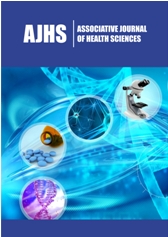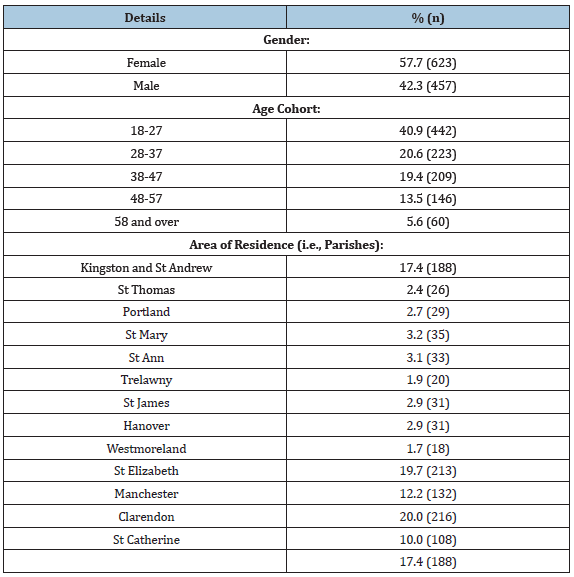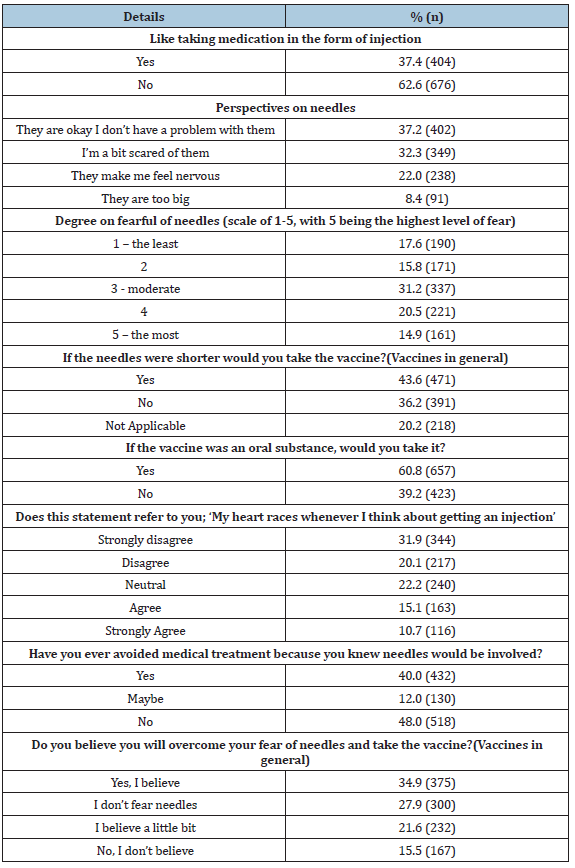- Submissions

Abstract
Associative Journal of Health Sciences
Does the Fear of Needles Influence Jamaicans’ Willingness to be Vaccinated against COVID-19?t
-
Open or ClosePaul Andrew Bourne1*, Diandre Allen2, Sephora Crumbie2, Tallia Scille2,
Shanise Simpson2, James Fallah3, Calvin Campbell4, Clifton Foster5, Caroline
McLean2, Dian Russell Parkes2, Tabitha Muchee6 and Devon Cross field7
1Department of Institutional Research, Northern Caribbean University, Jamaica
2Department of Nursing, Northern Caribbean University, Mandeville, Jamaica
3Department of Dental Hygiene, Northern Caribbean University, Jamaica
4Department of Mathematics and Engineering, Northern Caribbean University, Jamaica
5Department of Biology, Chemistry, and Environmental Sciences, Northern Caribbean University, Jamaica
6Department of Nutrition and Dietetics, Northern Caribbean University, Jamaica
7Medical Epidemiologist and Educational Administrative Consultant, Jamaica
*Corresponding author: Paul Andrew Bourne, Acting Director of Institutional Research, Northern Caribbean University, Mandeville, Manchester, Jamaica
Submission: January 22, 2022;Published: March 01, 2022

Abstract
Introduction: As of November 21, 2021, the vaccination rate in the world is 55% (fully vaccinated,
43%) compared to 22% in Jamaica (17% fully vaccinated), 70% in the United States and Canada, 66%
in Latin America, Asia-Pacific (64%), Europe (62%), Middle East (45%), and 9.7% in Africa. A variable
proportion of each country’s population is delaying or avoiding vaccination, which may hamper the
success of vaccination programmes. The frequency of needle injections averaged from 2-11 per person
each year in 10 major regions globally in a study conducted by the World Health Organization [1-10].
Aim: To explore whether the fear of needles influences Jamaicans’ willingness to be vaccinated?”
Methods and materials: The study used an explanatory web-based cross-sectional design. A
standardized questionnaire instrument consisting of fifteen closed-ended questions was disseminated
via WhatsApp, Facebook, and face-to-face interaction in the fourteen parishes. The Statistical Packages
for the Social Sciences (SPSS) 25 for Windows 27.0 provided data analysis (Table 1).
Table 1: Demographic characteristics of the sampled respondents, n=1,080.

Findings: Most of the respondents were females living in Clarendon who were hesitant to take the
vaccine due to trypanophobia. Of the total respondents, 62.6% (n=676) avoided medication requiring
administration through needles. The majority of the respondents (31.2%, n=337) was three on a scale
of 1-5 (with 5 being the highest level of fear). Most respondents (43.6%, n=471) answered “Yes” when
asked, “If the needles were shorter would you take the vaccine?” When asked if the following statement
referred to the: “My heart races when I think about getting an injection”, most of the respondents (31.9%,
n=344) agreed. Age, fear of needles, and willingness to accept oral vaccination accounted for 21.6% (i.e.,
Nagelkerke R2) of the variance in vaccination status (-2Ll=744.023; Omnibus test of Model coefficients:
χ2(8)=117.109, P < 0.001; Hosmer and Lemeshow test: χ2(8)=10.750, P-value = 0.216) [11-13].
Conclusion: The influence of trypanophobia on COVID-19 vaccination rates in Jamaica must
be considered when formulating future public media strategies, policymakers’ approach, and civic
responsibility in reducing vaccine hesitancy among the population. Therapeutic healthcare provider and
patient interactions are pivotal in increasing the patient’s confidence, willingness toward treatment, and
the strength to overcome trypanophobia (Table 2).
Table 2:Respondent’s views on needles/injections, n=1,080.

Keywords: COVID-19; Fear of needles; Injection; Needle; Needle phobia; Trypanophobia; Vaccine acceptance; Vaccine hesitancy
 a Creative Commons Attribution 4.0 International License. Based on a work at www.crimsonpublishers.com.
Best viewed in
a Creative Commons Attribution 4.0 International License. Based on a work at www.crimsonpublishers.com.
Best viewed in 







.jpg)






























 Editorial Board Registrations
Editorial Board Registrations Submit your Article
Submit your Article Refer a Friend
Refer a Friend Advertise With Us
Advertise With Us
.jpg)






.jpg)














.bmp)
.jpg)
.png)
.jpg)










.jpg)






.png)

.png)



.png)






